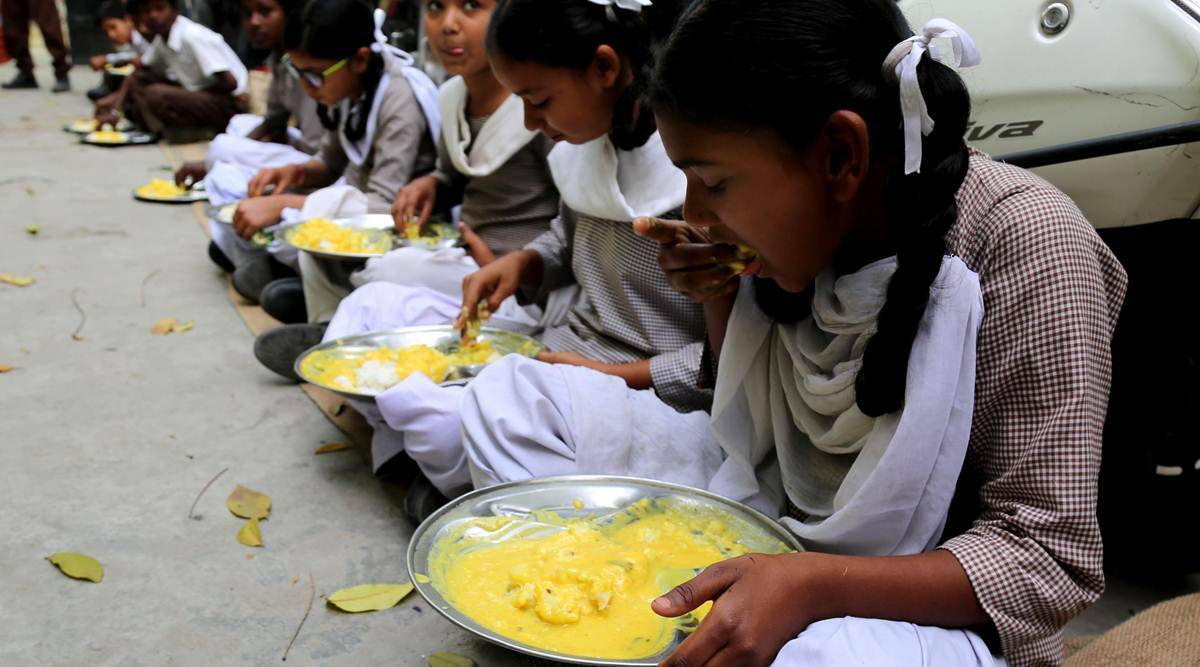 In Karnataka, proposals to add eggs have been fiercely resisted in the past by Lingayat and Jain seers.
In Karnataka, proposals to add eggs have been fiercely resisted in the past by Lingayat and Jain seers.There is “clear evidence of significant improvement” in the growth of children who are given eggs as part of mid-day meals, with girls in Class 8 gaining up to 71% more weight than their peers who were not served eggs, as per a study commissioned by the Karnataka government covering over 4,500 students in two districts.
The Body Mass Index (BMI) of children, both boys and girls, improved due to the introduction of eggs, and to some extent bananas, states the study. It refutes observations of another Karnataka government committee, on the National Education Policy, 2020, which said that serving eggs and meat in midday meals can cause “lifestyle disorders”.
Under the three-month-long study, between December 2020 and March 2021, on the impact of mid-day meals on the growth and nutrition of children, the authorities served eggs (and bananas as an alternative) to students in Yadgir, which is a backward district, while those in Gadag were provided regular vegetarian meals with milk.
Noting that there are no such previous studies on the impact of mid-day meal or any other supplementary nutrition programme in India, the report says the findings underline the need for additional protein and calories in all districts of Karnataka, particularly in the Kalyan region which is among its most backward in terms of socio-economic status and education.
Subscriber Only Stories
The two chosen districts were similar in terms of socio-demographic profile of the students, dietary diversity and consumption pattern of food. “Since there is no significant difference in these aspects, comparison for the purpose of the study is justified,” the report states.
It also points out that bananas, for all their benefits, cannot be a substitute for eggs, and urges authorities to explore alternative “protein rich vegetarian items”.
A 15-member team of Karnataka State Rural Development & Panchayat Raj University, comprising food scientists, public health experts and economists, monitored changes in the mean height, mean weight and mean BMI of the two sets of children from Yadgir and Gadag districts, enrolled across 60 schools in Classes 1 to 8.
Need more protein, calories
The report underlines the need for more protein and calories in mid-day meals in Karnataka, especially in districts that don’t serve eggs. Currently, eggs are served under the mid-day meal or PM Poshan scheme in seven Karnataka districts.
Among the key findings listed in the final report is that overall, more than 91% of the students had the mid-day meal regularly, and in Yadgir, over 98% consumed eggs, “allaying fears of cultural or traditional barriers” voiced by many, like the BJP’s Karnataka vice-president, Tejaswini Ananthkumar. The BJP leader recently said that serving eggs can be “exclusionary to many students who are vegetarians”.
Currently, eggs are served under the mid-day meal or PM Poshan scheme in seven Karnataka districts, while the proposal to bring other districts under its ambit remains pending with the BJP government in the state.
Weight: In each standard starting from Class 4, Yadgir boys gained 50%-60% (0.7 to 1.7 kg) more weight than Gadag students. Among Yadgir girls, 86.3% gained weight ranging from 0.9 to 3.6 kg, whereas in Gadag, 81.3% girls gained between 1.2-2.1 kg. “The 8th standard girls in Yadgir had gained 71% additional weight when compared to Gadag girls,” states the report, adding “this is a clear marker of improved weight gain among Yadgir school children, attributable to eggs and bananas”.
Malnutrition: In Yadgir, the number of severely underweight girls fell by 30% (from 18.9% to 13.4%), and the proportion of moderately undernourished girls by 42%. “On the contrary in Gadag district there was a marginal reduction (15%) in moderately undernourished girls only… The reduction of undernutrition among boys of Gadag did not give any significant trends.”
BMI: Among Yadgir girls, BMI improved by between 0.9, 0.8 and 1.1 in Classes 6, 7 and 8, respectively, and by 0.8, 0.7 and 1.2 among boys. In Gadag, the improvement was 0.1, 0.2, and -0.1 among girls in the respective classes, and 0, -3 and -1 in the same age cohort. Similar patterns emerged in lower primary grades. “These are clear indications of favoured improvement in BMI among all class Yadgir school children among both genders, that can be attributed to addition of Eggs/Banana,” states the report.
In total, 3,029 and 3,325 children were recruited for the study in Yadgir and Gadag, respectively, and the researchers followed up with 2,192 and 2,469 accordingly after 100 days.
“The mean weight and BMI gains in Yadgir are more compared to Gadag, showing an encouraging outcome of the additional intervention of eggs/banana in MDM (mid-day meal) and the need to continue for at least another one term and reassess the gains after a total of at least 100 eggs each year and three eggs per week over a period of one year,” it says.
A researcher involved with the study told The Indian Express: “The trends are indicative, but very encouraging. There was extensive dialogue with parents to identify the consumption pattern of food at the household level. Apart from growth, the attendance of students also rose by 10% in Yadgir.”
Currently, eggs are served in mid-day meals in 13 states and three UTs as part of “additional food items”, with the states/UTs picking the tab. The frequency ranges from five days a week to once a month.
In Madhya Pradesh, the previous Congress government’s decision to add eggs to the menu of anganwadis was overturned by the BJP after it came to power in 2020.
In Karnataka, proposals to add eggs have been fiercely resisted in the past by Lingayat and Jain seers.
- The Indian Express website has been rated GREEN for its credibility and trustworthiness by Newsguard, a global service that rates news sources for their journalistic standards.

